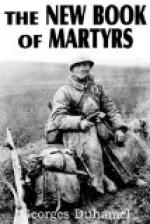“This is Marie—Marie Lerondeau, you know. He has a fractured thigh, but he is a very brave fellow. He stayed alone with the wagons.”
The visitors nod their heads admiringly, and Marie controls himself. He blushes a little, and the muscles of his neck swell with pride. He makes a sign with his eyes as if to say: “Yes, indeed, alone, all alone with the wagons.” And meanwhile, the dressing has been nearly finished.
The whole world must know that Marie stayed alone with the wagons. I intend to pin a report of this on the Government pension certificate.
Carre was only under fire once, and was hit almost immediately. He is much annoyed at this, for he had a good stock of courage, and now he has to waste it within the walls of a hospital.
He advanced through a huge beetroot field, and he ran with the others towards a fine white mist. All of a sudden, crack, he fell! His thigh was fractured. He fell among the thick leaves, on the waterlogged earth.
Shortly afterwards his sergeant passed again, and said to him:
“We are going back to our trench, they shall come and fetch you later.”
Carre merely said:
“Put my haversack under my head.”
Evening was coming on; he prepared, gravely, to spend the night among the beetroots. And there he spent it, alone with a cold drizzling rain, meditating seriously until morning.
It was fortunate that Carre brought such a stock of courage into hospital, for he needs it all. Successive operations and dressings make large drafts upon the most generous supplies.
They put Carre upon the table, and I note an almost joyful resolution in his look. To-day he has “all his strength, to the last ounce.”
But just to-day, I have but little to do, not much suffering to inflict. He has scarcely knitted his brows, when I begin to fasten up the apparatus again.
Then Carre’s haggard face breaks into a smile, and he exclaims:
“Finished already? Put some more ether on, make it sting a bit at least.”
Carre knows that the courage of which there was no need to-day will not, perhaps, be available to-morrow.
And to-morrow, and for many days after, Carre will have to be constantly calling up those reserves of the soul which help the body to suffer while it waits for the good offices of Nature.
The swimmer adrift on the open seas measures his strength, and strives with all his muscles to keep himself afloat. But what is he to do when there is no land on the horizon, and none beyond it?
This leg, infected to the very marrow, seems to be slowly devouring the man to whom it belongs; we look at it anxiously, and the white-haired Master fixes two small light-blue eyes upon it, eyes accustomed to appraise the things of life, yet, for the moment, hesitant.
I speak to Carre in veiled words of the troublesome, gangrenous leg. He gives a toothless laugh, and settles the question at once.




